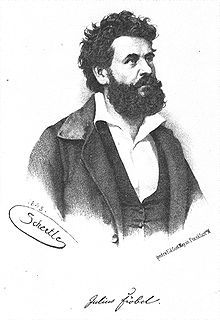Plan for a federal assembly of delegates
The plan for a federal assembly of delegates was an advance on Germany policy by Austria in 1862/1863. It was the first Austrian proposal for a reform of the German Confederation at this time. The state parliaments of the individual German states should elect members who would advise the Bundestag in assemblies of delegates .
After Prussia prevented the assembly of delegates at the Bundestag, Austria launched a second, more comprehensive reform plan. As the Frankfurt Reform Act , it was the subject of discussion at the Frankfurt Fürstentag in the summer of 1863. The idea of an assembly of delegates reappeared as an assembly of representatives. This reform plan also failed because of the opposition from Prussia, which demanded a directly elected federal parliament.
Reform plan

At the beginning of the 1860s, Austria took the initiative to not only reject the proposals of others in the German Confederation, but to be able to present its own positive offer. In doing so, Austria risked excluding Prussia if necessary and reaching an agreement with the medium-sized German states such as Bavaria and Hanover.
The Germany department of the Austrian State Chancellery drew up a draft reform that included ideas from Julius Froebel from 1861. The former revolutionary envisioned a three-person federal board of directors that set up a federal executive. A federal assembly as parliament should include a princely house and a state house. A federal court rounded off the proposal. On July 7, 1862, a conference of ambassadors accredited in Vienna began in Vienna. Represented were Bavaria , Hannover , Württemberg , Saxony , Hesse-Darmstadt, Hesse-Kassel, Nassau and Saxony-Meiningen, while Prussia had protested politely and stayed away. The conference agreed on August 10:
- Assembly of delegates at the Bundestag, with members elected by the state parliaments
- They would advise the Bundestag on the planned federal laws on civil procedure and the law of obligations.
- Establishment of a federal court
Rejection

Prussia rejected this as not going far enough and also protested when the Bavarian Bundestag envoy welcomed a meeting of delegates on December 18, 1862. Because the corresponding motion would have changed the Federal Constitution, it required unanimity in the Bundestag, so Prussia found. The new Prussian Prime Minister Otto von Bismarck threatened Prussia's rapprochement with France, an exit from the German Confederation and even war. Prussia could only bear an expansion of the federal government if the Bundestag were given a counterweight, namely a “national representation”, a directly elected federal parliament.
On January 22nd, 1863, the Bundestag voted on whether there should be assemblies of delegates to discuss civil procedure and the law of obligations. Austria, Bavaria, Hanover, Württemberg, Saxony, Hessen-Darmstadt and some small states were in favor. These seven votes were subject to a majority of nine votes: Prussia had convinced many states that a Prussian exit and war would endanger them.
Ernst Rudolf Huber : "January 22nd, 1863 was the starting point for the authoritarian-liberal compromise on which Bismarck's policy for founding an empire and constitution would be based." But the defeat had something good for Austria: it was able to get behind the colorless assembly of delegates let yourself go and start a major overhaul of the federal government. Austria wanted to present this major reform plan to the German princes at a meeting in Frankfurt.
See also
supporting documents
- ^ Ernst Rudolf Huber: German constitutional history since 1789. Volume III: Bismarck and the realm . 3rd edition, W. Kohlhammer, Stuttgart a. a. 1988, pp. 416/417.
- ^ Ernst Rudolf Huber: German constitutional history since 1789. Volume III: Bismarck and the realm . 3rd edition, W. Kohlhammer, Stuttgart a. a. 1988, pp. 417-419.
- ^ Ernst Rudolf Huber: German constitutional history since 1789. Volume III: Bismarck and the realm . 3rd edition, W. Kohlhammer, Stuttgart a. a. 1988, pp. 419/420.